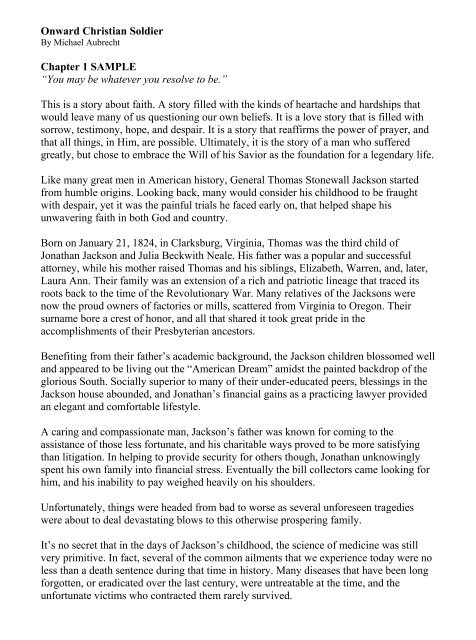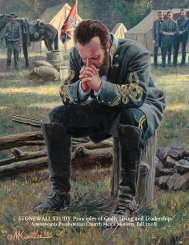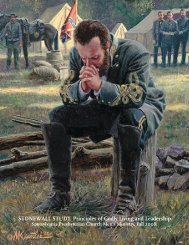Onward Christian Soldier - Pinstripe Press by Michael Aubrecht
Onward Christian Soldier - Pinstripe Press by Michael Aubrecht
Onward Christian Soldier - Pinstripe Press by Michael Aubrecht
Create successful ePaper yourself
Turn your PDF publications into a flip-book with our unique Google optimized e-Paper software.
<strong>Onward</strong> <strong>Christian</strong> <strong>Soldier</strong><br />
By <strong>Michael</strong> <strong>Aubrecht</strong><br />
Chapter 1 SAMPLE<br />
“You may be whatever you resolve to be.”<br />
This is a story about faith. A story filled with the kinds of heartache and hardships that<br />
would leave many of us questioning our own beliefs. It is a love story that is filled with<br />
sorrow, testimony, hope, and despair. It is a story that reaffirms the power of prayer, and<br />
that all things, in Him, are possible. Ultimately, it is the story of a man who suffered<br />
greatly, but chose to embrace the Will of his Savior as the foundation for a legendary life.<br />
Like many great men in American history, General Thomas Stonewall Jackson started<br />
from humble origins. Looking back, many would consider his childhood to be fraught<br />
with despair, yet it was the painful trials he faced early on, that helped shape his<br />
unwavering faith in both God and country.<br />
Born on January 21, 1824, in Clarksburg, Virginia, Thomas was the third child of<br />
Jonathan Jackson and Julia Beckwith Neale. His father was a popular and successful<br />
attorney, while his mother raised Thomas and his siblings, Elizabeth, Warren, and, later,<br />
Laura Ann. Their family was an extension of a rich and patriotic lineage that traced its<br />
roots back to the time of the Revolutionary War. Many relatives of the Jacksons were<br />
now the proud owners of factories or mills, scattered from Virginia to Oregon. Their<br />
surname bore a crest of honor, and all that shared it took great pride in the<br />
accomplishments of their Pres<strong>by</strong>terian ancestors.<br />
Benefiting from their father’s academic background, the Jackson children blossomed well<br />
and appeared to be living out the “American Dream” amidst the painted backdrop of the<br />
glorious South. Socially superior to many of their under-educated peers, blessings in the<br />
Jackson house abounded, and Jonathan’s financial gains as a practicing lawyer provided<br />
an elegant and comfortable lifestyle.<br />
A caring and compassionate man, Jackson’s father was known for coming to the<br />
assistance of those less fortunate, and his charitable ways proved to be more satisfying<br />
than litigation. In helping to provide security for others though, Jonathan unknowingly<br />
spent his own family into financial stress. Eventually the bill collectors came looking for<br />
him, and his inability to pay weighed heavily on his shoulders.<br />
Unfortunately, things were headed from bad to worse as several unforeseen tragedies<br />
were about to deal devastating blows to this otherwise prospering family.<br />
It’s no secret that in the days of Jackson’s childhood, the science of medicine was still<br />
very primitive. In fact, several of the common ailments that we experience today were no<br />
less than a death sentence during that time in history. Many diseases that have been long<br />
forgotten, or eradicated over the last century, were untreatable at the time, and the<br />
unfortunate victims who contracted them rarely survived.
In March of 1826, both Thomas’ father and sister Elizabeth, who was age six at the time,<br />
contracted a fatal case of typhoid fever. Adding to both the agony and irony of the<br />
situation, Julia gave birth to her fourth child, Laura Ann, the very next day after her<br />
husband had died. Now a widow and mother of four, at the tender young age of twentyeight,<br />
Thomas’ mother was left with extensive financial debt and the inability to support<br />
her family.<br />
Desperate and rapidly falling into an impoverished state, she realized that her only choice<br />
to provide for her children was to remarry. Unfortunately for the Jackson children, Julia’s<br />
judgment had been clouded <strong>by</strong> the overwhelming grief and guilt often experienced <strong>by</strong><br />
widows who are left with few alternatives.<br />
As a result, her choice in a replacement for her beloved Jonathan fell well short of both a<br />
parent and a provider. Her new husband, Blake Woodson, not only disliked his<br />
stepchildren immensely, but was also financially unstable. The previous harmony of the<br />
Jackson household was almost immediately pushed aside <strong>by</strong> the arrival of their new<br />
stepfather. Still grieving the loss of their own father, the children’s once promising future<br />
was now bleak and void of hope.<br />
In order to appease her newfound husband and provide a loving environment for her<br />
children, Julia made the ultimate sacrifice, and sent Thomas and Laura to live with<br />
Jonathan’s relatives in West Virginia, while Warren went to stay with Julia’s own kin.<br />
Despite the “loss” of his mother, her deep religious faith and the way in which she<br />
accepted her own fate would stay in Jackson’s memory for years to come.<br />
During the Civil War, he would later recall her grace and tenderness often while on<br />
campaign, and confided in his chaplain that she was rarely absent in his thoughts. He<br />
often said that she was his inner strength, and that any man could be measured <strong>by</strong> the<br />
mother that raised him.<br />
Brokenhearted, Julia passed away after suffering complications during childbirth, on<br />
December 4, 1831. Although her newborn, William Woodson, survived her death, Julia’s<br />
husband had little regard for his son’s half brothers or sister, and had no intention of<br />
reuniting the family. Thus, both Thomas and Laura spent the remaining years of their<br />
childhood nursing their emotional wounds in the custody of their parental uncles. Warren,<br />
however, was not as lucky, and later died of tuberculosis in 1841.<br />
Growing up with his uncle in Jackson’s Mill, Thomas practiced the Episcopalian faith in<br />
which he had been baptized, but never confirmed. His enthusiasm for studying the Word<br />
of God was far from fruition, and the principles of the <strong>Christian</strong> faith were just beginning<br />
to take hold of him.<br />
During his early teens, Thomas’ intellectual abilities began to blossom, and he soon<br />
developed a gifted memory that enabled him to quote Scripture on demand. Despite his<br />
Biblical book-knowledge and <strong>Christian</strong> upbringing, Jackson never fully embraced his<br />
faith until converting to Pres<strong>by</strong>terianism as a young man.
Despite his lack of religious fervor, Thomas was known throughout his upbringing as a<br />
boy of high moral character. Often, he would defend girls who were being teased <strong>by</strong><br />
those who were rustic and immature.<br />
Sometimes he would take on bullies twice his size on their behalf, and his chivalry often<br />
ended in bruised eyes and egos. His courage, at the time, was without question, but his<br />
motives may have been more anger related and less compassionate. It was understandable<br />
that the hurt and pain of his interrupted childhood haunted Jackson from time to time,<br />
and a call to faith would later provide a welcome cure.<br />
At the tender age of seventeen, Thomas took an unlikely position as a constable for the<br />
county. Acting as a minor sheriff, he was tasked with distributing warrants, collecting<br />
debts, and summoning witnesses for the local court.<br />
After surviving an obscure bout of dyspepsia, himself, Jackson believed that the physical<br />
requirements of the job would help him maintain fitness. Following the death of his<br />
father, sister, and brother to disease, Thomas had become excessively health conscious,<br />
and his severe fear of contracting any illness would later result in obsessive-compulsive<br />
behavior.<br />
Over the next two years, Thomas served his county well, and honed the meticulous habits<br />
that would later benefit him on the battlefield. Due to his reputation as a promising young<br />
member of the law enforcement community, the now nineteen-year-old was eventually<br />
offered a full government-funded scholarship at the nation’s most prestigious military<br />
academy. The nomination offered a tremendous opportunity for both a first-class<br />
education, as well as an honorable career in the United States Army. What more could an<br />
orphaned boy ask for?<br />
Without the slightest hesitation, Cadet Jackson immediately packed up his few<br />
belongings and headed straight for West Point.<br />
For more please purchase the book







